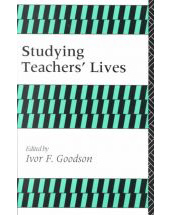Studying Teachers' Lives
Studying Teachers' Lives - problems and possibilities
This intersection with the psychological or psychoanalytic approach opens up a new and, I believe, potentially perilous terrain for collaboration. Again Measor and Sikes honestly confront their own naivety in this regard:
The point is that when we began the project, we honestly did not know whether taking part in it would have any effect on people's lives, or rather whether they would perceive it to have any effects. One of the issues that emerged was the way that some of our respondents took advantage of the counselling potential of the interviewing sessions. There were some limited points of comparison with a Rogerian style of counselling, in that we listened, reflected back, asked questions which encouraged people to reflect on their actions and did not pass judgement, We also dealt with the intimate. We did make it clear that we were researchers, not anything more...
The same protestation is made by Butt et al. to the criticism of 'practises therapy without a license'. 'Our position, very simply, is that we do not see ourselves as practising therapy.
I am not sure that such self-definition and protestation is sufficient in resolving this dilemma. If the co-partners in a collaboration treat sessions as counselling or therapy sessions this has implications for research study. For instance, there are clearly instances where one might not (or indeed might) pursue a line of questioning because of judgements of a more psychoanalytic kind about a person's self-esteem, repressed fear, and so on. Counselling/therapy in short would push us in one direction, research in another. This distinction must be made clear early in the collaborative pact. It is particularly important in the field of teacher development for the aim of professional development likewise can occasionally travel in a different direction to a prior research mission.
In general the ethical and methodological dilemmas I have noted would be best dealt with through clear procedural guidelines. For instance, the counselling/therapy and research distinction should be faced and discussed early in the collaboration between academic and teacher and some procedural guidelines drawn up. Similarly the question of the ownership of the data should be discussed and resolved. For instance, in our own work at RUCCUS (Research Unit on Classroom Learning and Computer Use in Schools) at the University of Western Ontario we have a range of projects studying teachers' lives. In all cases we go through the same procedure of informed consent, followed by feedback and negotiation of all data and reports; teachers have a final power of veto over the data and reports in which they feature[i].
[i] Goodson, I.F and Mangan, J.M. (eds) (1991) Qualitative Educational Research Studies: Methodologies in Transition, RUCCUS Occasional Papers Vol. 1, RUCCUS.UWO, London, Ontario.
